НАРАТИВ ЯК ЗАСІБ ПЕРЕТВОРЕННЯ ТРАВМАТИЧНИХ ДОСВІДІВ
DOI:
https://doi.org/10.20998/2078-7782.2023.4.06Ключові слова:
наратив, наративна психологія, історії травм, наративна психотерапіяАнотація
Анотація: розглянуто поняття “наративної терапії”, проаналізовано різноманітні дослідження та роботи присвячені вивченню наративного підходу в практичній діяльності. Сформульовано переваги використання наративного методу у психологічній діяльності, а також описано недоліки, з якими може зіткнутися фахівець під час використання даного методу в роботі.
Посилання
Drake, D. (2020), “Narrative coaching”, The Coaches’ Handbook, Routledge, pp. 257 – 266
Abanina, G. (2017), “Using narrative practices to overcome the consequences of traumatic situations”, Personality in the context of crisis challenges of our time: Materials of the methodological seminar The National Academy of Sciences of Ukraine, 24 March 2016, edited by Academician of the National Academy of Pedagogical Sciences of Ukraine Maksymenko S., K., pp. 427 – 433
Abanina, G., Opanasiuk, O. (2020), “The narrative approach in modern psychology”, State, regions, entrepreneurship: informational, socio-legal, socio-economic aspects of development – abstracts of the II International Conference, 20 November 2020, K.: KROK University, pp. 188 – 190
Abanina, G. (2019), “Narrative practices of overcoming traumatic experiences”, State, regions, entrepreneurship: informational, socio-legal, socio-economic aspects of development – Materials of the international conference, К.: Університет “КРОК”. – 21-22 November 2019, pp. 401 – 403
Abanina, G. (2020), “Narrative practices as a resource for overcoming the effects of media trauma”, Proceedings of the First All-Ukrainian Scientific Conference “Media Trauma in the Context of Information Warfare: Psychological and Pedagogical Aspects”, Electronic resource
Abanina, G. (2017), “Strategies for coping with psychotraumatic experience in the context of the narrative approach”, Legal Bulletin of KROK University, K.: KROK University of Economics and Law, is. 27, pp. 140 – 144
White, M. (2010), “Narrative practice maps: an introduction to narrative therapy“, M.: Genesis, p. 326
Goncharova (Sklyarova), G., Varakina, Y. (2022), “Advantages of using the narrative approach in crisis situations”, State, regions, entrepreneurship: informa-tional, socio-legal, socio-economic aspects of development: abstracts of the IV International Conference, 7 December 2022, Kyiv: KROK University
Karskanova, S. (2019), “Using narrative as a method of social and psychological diagnosis of personality”, Scientific Bulletin of Kherson State University, Series: “Psychological Sciences”, no. 1, pp. 30 – 35
Mironenko, G. (2015), “Living a new narrative as a way of psychological rehabilitation in a post-traumatic situation”, Kyiv Scientific and Pedagogical Bulletin, no. 6(06), К., pp. 71 – 75
Miliutina, K. (2023), “Using narrative psychotherapy in work with refugees and IDPs”, Socio-psychological technologies of personality development: a collection of scientific papers based on the materials of the VIII All-Ukrainian scientific and practical conference of young scientists, graduate students and students “Socio-psychological technologies of personality development”, 7 April 2023, Editorial board: Krupnyk I., Popovych I., Tavrovetska N., Tanasiichuk O. (responsible for the issue) [et al], Kherson State University: KSU, pp. 127 – 130
Chepeleva, N., Smulson, M., Shylovska, O., Hutsol, S. (2007), “Native psychotechnologies”, Series: “Psychol. Instrumentarium”, Under the editorship Chepeleva N., K.: Glavnyk, p. 144
Shebanova, V. (2018), “Application of visual and narrative approach tools in psychological assistance to individuals”, Psycholinguistics, no. 24(1), pp. 381 – 402
Gubrium, J., Holstein, J. (2009), “Analyzing Narrative Reality”, Thousand Oaks, CA: Sage
Meadows, D. (2003), “Digital storytelling: Research-based practice in new media”, Visual Communication, no. 2(2), pp. 189 – 193
Lenette, C., Cox L., Brough, М. (2015), “Digital Storytelling as a Social Work Tool”, British Journal of Social Work, no. 45, pp. 988 – 1005.
Sween, E. (1998), “The one—minute question: What is narrative therapy?”, Gecko, vol. 2, pp. 55 – 67
Van Wyk, R. (2008), “Narrative house: a metaphor for narrative therapy: tribute to Michael White”, IFE Psychologia,vol.16, no.2, pp. 294 – 319
White, M., Epston, D (1990), “Narrative means to therapeutic ends”, New York: Norton, p. 229
Mishler, E. (1995), “Models of narrative analysis: A typology”, Journal of Narrative and Life History, vol. 5, pp. 87 – 123
Mishler E. (1986), “Research Interviewing”, Context and Narrative, Cambridge, MA: Harvard University Press
Shakeri, J., Ahmadi, S., Maleki, F., [et al.] (2020), “Effectiveness of group narrative therapy on depression, quality of life, and anxiety in people with amphetamine addiction: A randomized clinical trial”, Iranian Journal of Medical Sciences, vol.45(2), p. 91
Zarra-Nezhad, M., Pakdaman, F., Moazami-Goodarzi, A. (2023), “The effecti-veness of child-centered group play therapy and narrative therapy on preschoolers’ separation anxiety disorder and social-emotional behaviours”, Early Child Develop-ment and Care, vol. 193(6), pp. 841 – 853
Draper, A., Marcellino, E., Ogbonnaya, C. (2022), “Narrative therapy and continuing bonds enquiry with refugees and asylum seekers: Bridging the past and the future”, Journal of Family Therapy, vol. 44(4), pp. 520 – 534.
Saltsman, A., Majidi, N. “Story-telling in Research with Refugees: On the Promise and Politics of Audibility and Visibility in Participatory Research in Contexts of Forced Migration”, Journal of Refugee Studies, vol. 34, is. 3, pp. 2522 – 2538
Acosta, D., Haden, C. “Supporting Latine children's informal engineering learning through tinkering and oral storytelling”, Developmental psychology, vol. 59(12), pp. 2342 – 2355
Truncellito, R., VanEpps, E., “That one time when: Reframing negative experiences with storytelling”, Current Opinion in Psychology, vol. 54:101697
##submission.downloads##
Опубліковано
Номер
Розділ
Ліцензія
Авторське право (c) 2023 Софія Клочко

Ця робота ліцензується відповідно до Creative Commons Attribution-NonCommercial-NoDerivatives 4.0 International License.
Автори, які публікуються у цьому журналі, погоджуються з наступними умовами:- Автори залишають за собою право на авторство своєї роботи та передають журналу право першої публікації цієї роботи на умовах ліцензії Creative Commons Attribution License, котра дозволяє іншим особам вільно розповсюджувати опубліковану роботу з обов'язковим посиланням на авторів оригінальної роботи та першу публікацію роботи у цьому журналі.Автори, які публікуються у цьому журналі, погоджуються з наступними умовами:

